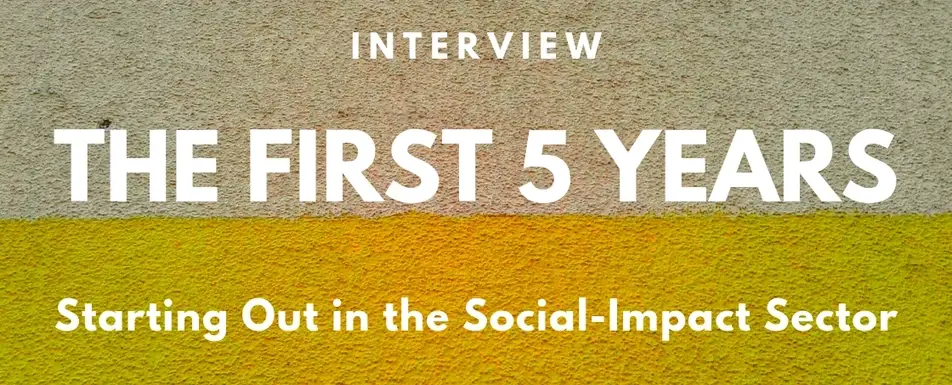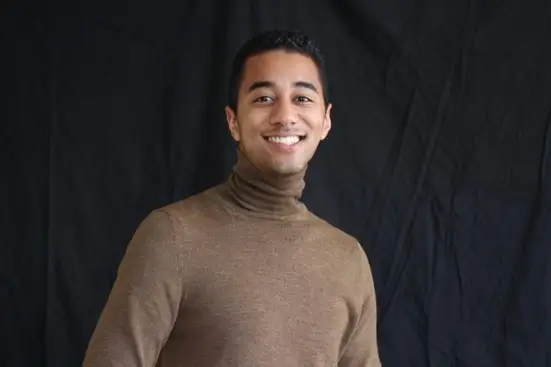Starting Out in the Social-Impact Sector | An Interview with Anthony Flowe

It's summer, which means that many of our readers have recently graduated from university programs. Perhaps you've already got a job in the social-impact sector—or maybe you're still on the hunt.
For this new interview series, we're chatting with changemakers who are in their first five years of social-impact work. They may be early in their careers, but they have plenty of insights on post-college life, workplace challenges, and landing that first job.

This month, we're talking to Anthony Flowe, who graduated with a BA in communications from George Mason University in 2014. He currently works as an engagement and communications associate at the U.S. Global Change Research Program.
1. What was your first post-college job? How did it align with the career goals you set while in college?
During college, I explored many academic and professional interests, which led to shifting career goals up to graduation. I changed my major several times—I started in graphic design and dabbled with health and psychology before landing in communication. I was very active in cultural and community service student organizations where I also served in leadership roles. While I had a wide variety of interests, I worked to build up skills in these different areas. That’s served me well in my career so far.
When I graduated, I reflected back on my college experience to really figure out what I wanted to do with my life. I knew I wanted to work on a global scale; use my skills in communications, social psychology, and design; and work with people to address the issues impacting their livelihoods.
My approach was simple: I asked people about industries that matched my interests, went on Idealist.org, and applied to global development organizations. A few months later, I landed my first job as a communications assistant!
2. How did you enter the social-impact space? Were you at a nonprofit or NGO straight out of college or did you take a longer path to arrive in the field?
I got into social-impact work through the global development sector right after college. Sometimes I feel like my entire life was building me up for this path: having spent half of my life with my father in the military, I had firsthand experience seeing how foreign aid affected and influenced people both on a national and local scale. I also spent many years in close proximity to religious and faith-based groups that believed in who serving both local and international communities. I feel lucky to have had those experiences to familiarize me with the sector's culture.
But I think the most important thing I learned was the power of knowing myself and telling my story in a way that resonated with others. This is a valuable skill whether you want to promote yourself in an interview or build bridges with someone you may not think has much in common with you.
I also have a great appreciation for all those who supported me and gave me opportunities. There’s difficulty entering and maneuvering corporate spaces no matter the sector—especially as someone with multiple intersecting marginalized identities. But I’ve been fortunate to have people believe in me, and those people have most often been women and/or people of color.
3. What has been the most challenging aspect of post-college working life?
There's a competitive environment in Washington, DC, which can feel challenging to keep up with. As a young professional, I always feel the need to prove myself. In some instances, it can be a bit ruthless. But in most cases it calls for someone to be very secure in who they are and confident in their own abilities.
What’s worked for me is forming genuine relationships with people. It humanizes people and gives you insight on people’s perspectives and experiences. After all, we’re all out here trying to make the best life for ourselves.
4. If someone had posed the "where do you see yourself in five years" question on your graduation day, what would you have said?
I would have said something more abstract like, “I hope I am working at a job where I feel fulfilled in the work I am doing, where I have the opportunity to learn and grow. I hope to be contributing to a mission that is addressing global issues that people are facing.” Because rather than the title or credential, I’m more interested in the impact I am making on other people’s lives.
5. Is your current career path in line with that five-year vision?
Five years after graduating college, my vision still remains abstract. But I have remained within the theme of what I originally intended for myself, which is to work in roles and for organizations where I contribute to informing people on meaningful, relevant issues.
The difference between then and now is that I have more of an understanding of different fields I’ve dabbled in—and a clearer idea of professional paths forward in those areas. I would say that I am very satisfied with how things have panned out, and I remain optimistic about my professional life moving forward.
6. What is your favorite part of your current job?
I love my current job! More than anything, I love that it allows me to pursue my interests. I consider myself a lifelong student at heart, with a deep passion for learning and growing.
My primary role focuses on social media, graphic design, and other communications work. But I’ve had the opportunity to do so much more: plan and execute events; attend conferences; contribute to one of our major reports (The Fourth National Climate Assessment); coordinate activities for our Social Science Coordinating Committee; and develop papers and recommendations on diversity, equity and inclusion.
7. Of all the skills you picked up in your college courses, what has been the most useful in your career so far? And what skills have you picked up along the way to fill in the gaps?
Many of the applied communications skills I learned in college have been useful in my career. These include writing across different media, graphic and layout design, and web coding. The things I learned along the way were the analytics and data tracking for social media and website engagement, specific mailing and content management software, and the more foundational sector-specific bits of knowledge.
8. Have you done any volunteer work? Has that experience been useful in your career?
I spent a great deal of my time in college volunteering with cultural organizations. More recently, I’ve volunteered as an English language teacher, academic mentor, social media strategist, and LGBT+ organizer. These are all personal and professional interests of mine, and have helped me build skills in line with my current career trajectory (e.g. specific social media skills and a deeper understanding of challenges around wellness and education for marginalized groups).
9. Are you planning to pursue any additional education or certifications?
I hope to pursue a graduate degree in the next few years. I’m currently doing research on whether a master’s or a PhD would better position me professionally moving forward. In terms of specific programs, I’m looking at International Communications and Education, Social Psychology, Anthropology, and Sociology.
10. What advice do you have for 2019 graduates who want to enter the social-impact space?
If you want to enter the social-impact space doing communications work, I would advise graduates to always maintain a “student mentality.” Be curious and passionate about your growth, continuous learning, and uplifting those around you. Volunteer experience can work favorably for you since it demonstrates an interest in service.
It’s also important to become a jack of all trades, especially in skills related to design, technology, and data analytics. The field is competitive and technology is always moving forward. I'd also say that mastering general writing skills and different styles is important to understand how to best reach different audiences. I would also recommend learning a language so you can be skilled in translation, writing, and editing work in other languages (the U.N. official languages are a good place to start). These skills will be important, especially if you don’t have foundational knowledge in the field or sector.
And never underestimate soft skills. Negotiation, diplomacy, facilitation, and a team-oriented mindset, combined with a healthy level of tenacity, can really go a long way.
Lastly, never sacrifice who you are. Always keep pursuing what you are interested in, and remember that a career is a marathon, not a sprint. Just keep going and never give up on yourself and your dreams!
by Elyse Franko

